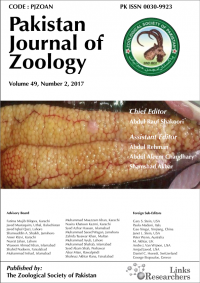Heavy metals considered as the most toxic pollutants in aquatic system. These are important inducers of oxidative stress in aquatic animals, promoting the formation of reactive oxygen species (ROS) which ultimately leads to tissue damage and oxidation of biomolecules. Aquatic organisms possess antioxidant system to cope with the oxidative stress. This research was conducted to see the effect of lead on peroxidase activity (antioxidant enzyme) in the gills and liver of Labeo rohita. Experiment was conducted in the laboratory by exposing four groups of Labeo rohita to different doses of PbCl2 viz. 96-h, 2/3rd, 1/4th and 1/5th of LC50, separately, for 30 days and compared with control group. After 30 days, fish was sacrificed and their gills and liver isolated to determine the effect of PbCl2 on peroxidase activity. Activity of peroxidase enzyme in metal stressed fish was compared with control. The physico-chemical parameters of the test media viz. pH, dissolved oxygen, carbon dioxide, total hardness, calcium, magnesium and total ammonia were monitored on daily basis. Significantly increased peroxidase activity was observed in gills and liver of Labeo rohita after exposure to PbCl2 due to all doses as compared to the control. All results were statistically significant at p<0.05. Fish liver exhibited significantly (p<0.05) higher activity of enzyme than that of gills. The physico-chemical variables viz. pH, dissolved oxygen, carbon dioxide, total hardness, calcium, magnesium and total ammonia of the test media varied significantly at p<0.05, that exerted significant effects on peroxidase activities in gills and liver of fish. This study clearly indicates the defensive nature and adaptive mechanisms of tissues (gills and liver) against free radical induced toxicity.









